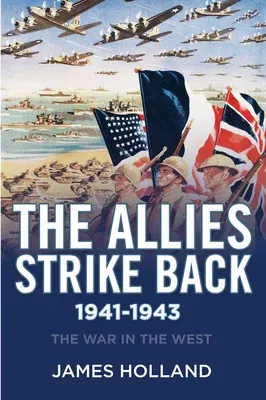By June 1941, Germany's war machine looked to be unstoppable. The Nazi
blitzkrieg had taken Poland, France, and Holland with shocking speed.
The Luftwaffe had bombed London, while German U-boats wrought havoc on
Allied shipping on the Atlantic. And yet, as James Holland shows at the
start of The Allies Strike Back, 1941-1943--the second volume in his
magisterial narrative of World War II in the West--cracks were already
appearing in Germany's apparent invincibility. Shortages of food and
materiel were becoming critical. And, having failed to defeat Britain,
Adolf Hitler fatefully pivoted east to invade the Soviet
Union--territory he felt compelled to conquer for Germany's
protection--and on June 22, 1941 precipitated the largest clash of arms
the world had ever seen. Built for speed and quick conquest, German
forces by that fall were bogged down in a horrible war of attrition that
blunted the Nazi momentum.
The Allies Strike Back offers fascinating new perspective on the
critical middle years in World War II's western theatre, as the
advantage between Axis and Allied forces swung back and forth on the
Atlantic and eastern front, and in north Africa and Europe. Acclaimed
historian James Holland has spent years conducting original research and
interviews, mining newly available archives, visiting battlefields and
uncovering letters and diaries previously unread. Acknowledging that
strategy and tactics have been the focus of previous histories, he gives
equal space to the logistics and supply of men and materiel without
which no war can be fought. Allied and Axis leaders criss-cross
Holland's narrative, but he also memorably introduces readers to
heretofore unknown participants: Sgt. Ralph Schaps, who experienced the
Louisiana Maneuvers that propelled him into Europe; Colonel Hermann
Balck, in command of a German panzer regiment in Africa; U-boat captain
Teddy Suhren, operating against Allied shipping in the Atlantic; Billy
Drake, squadron commander in Britain's Desert Air Force that helped turn
the tide in North Africa; and many others.
Following the acclaimed first volume of his trilogy, The Rise of
Germany, and offering frank assessments of successes and failures on
both sides, James Holland has crafted a masterful and gripping narrative
of the events that ultimately determined the outcome of World War II.

